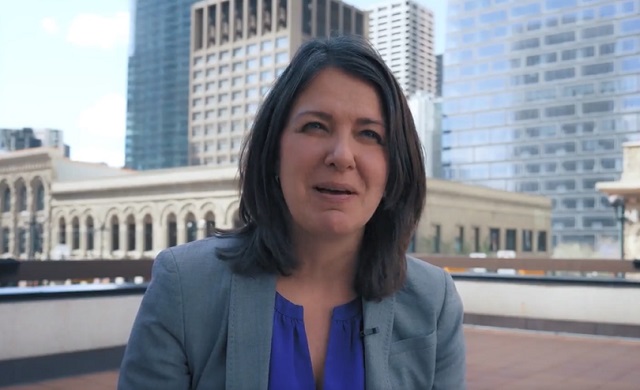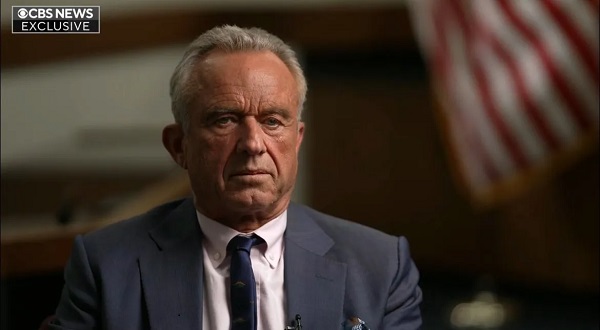Alberta
Danielle Smith slams Trudeau’s methane emissions rules as ‘unrealistic,’ ‘unconstitutional’

From LifeSiteNews
‘Instead of building on Alberta’s award-winning approach, Ottawa wants to replace it with costly, dangerous and unconstitutional new federal regulations that won’t benefit anyone beyond Environment and Climate Change Minister Steven Guilbeault’s post-office career,’ a joint statement read
Alberta Premier Danielle Smith condemned the Trudeau government’s methane emissions cap as “unrealistic” and “unconstitutional.”
On December 4, Smith and Minister of Environment and Protected Areas Rebecca Schulz issued a joint statement blasting Environment Minister Steven Guilbeault’s new draft methane regulations.
“The federal government has unilaterally established new methane emissions rules and targets to help win international headlines,” the joint statement read.
“Instead of building on Alberta’s award-winning approach, Ottawa wants to replace it with costly, dangerous and unconstitutional new federal regulations that won’t benefit anyone beyond Environment and Climate Change Minister Steven Guilbeault’s post-office career,” it continued.
The proposed regulations, drafted December 4 after the 2023 United Nations Climate Change Conference (COP28) in Dubai, restrict oil and gas methane emissions to allegedly reduce “climate change.”
“The proposed methane regulations are consistent with Canada’s commitment to cap and cut oil and gas emissions and with calls from the International Energy Agency for all oil- and gas-producing countries to reduce methane emissions from the sector by 75 percent by 2030,” the news release read.
Under the proposed plan, methane regulations must reduce by 217 megatonnes (carbon dioxide equivalent) from 2027 to 2040.
“Canada is on track to meet its 2025 methane reduction target of 40 to 45 percent below 2012 levels,” the statement asserted. “The draft regulations published today are amendments to the 2018 methane regulations.”
In response to the regulations, Smith pointed out that Alberta has the autonomy to determine its own climate regulations without the direction of the Liberal government under the leadership of Prime Minister Justin Trudeau.
“Managing emissions from Alberta’s oil and gas industry is our constitutional right and responsibility, not Ottawa’s, and we are getting the job done,” Smith declared. “Using a province-led approach, Alberta has already reduced methane emissions from the oil and gas sector by 45 percent – hitting our target three years early – and we’re just getting started.”
“Meanwhile, not only is it illegal for Ottawa to attempt to regulate our industries in this manner, Ottawa also hasn’t even hit one of its past arbitrary and unscientific emissions targets,” she revealed.
“Once again, the federal government is setting unrealistic targets and timelines,” Smith added. “Infrastructure can only be updated as quickly as technology allows. For example, Alberta will not accept nor impose a total ban on flaring at this time, as it is a critical health and safety practice during production.”
“Given the unconstitutional nature of this latest federal intrusion into our provincial jurisdiction, our government will use every tool at our disposal to ensure these absurd federal regulations are never implemented in our province,” Smith concluded.
This is hardly the first time Smith has defended Alberta from Trudeau’s climate regulations. Smith has repeatedly asserted Alberta’s right to control power grid, promising the province will not be “transitioning away” from oil and natural gas.
Smith has warned that Canadians could freeze in the winter if the new “clean emissions” regulations are enforced, an assertion supported by Alberta’s electric grid operator, Alberta Electric System Operator (AESO), which warned that Trudeau’s 2035 net-zero power grid goal will mean instability for the western province and are “not feasible.”
Two recent court rulings dealt a serious blow to the Trudeau government’s environmental activism via legislation. The most recent was in November when the Federal Court of Canada ruled in favor of Alberta and Saskatchewan and overturned the Trudeau government’s ban on single-use plastic, calling it “unreasonable and unconstitutional.”
The second victory for Alberta and Saskatchewan concerns a Supreme Court ruling that stated that Trudeau’s law, C-69, dubbed the “no-more pipelines” bill, is “mostly unconstitutional.” The decision returned authority over the pipelines to provincial governments, meaning oil and gas projects headed up by the provinces should be allowed to proceed without federal intrusion.
In May, Guilbeault declared that violating environmental regulations banning the use of coal and gas-fired power after 2035 may even result in criminal sanctions, a statement that only increased the tension between the federal government and the provinces opposed to the proposed policies.
Alberta
Alberta takes big step towards shorter wait times and higher quality health care

From the Fraser Institute
On Monday, the Smith government announced that beginning next year it will change the way it funds surgeries in Alberta. This is a big step towards unlocking the ability of Alberta’s health-care system to provide more, better and faster services for the same or possibly fewer dollars.
To understand the significance of this change, you must understand the consequences of the current (and outdated) approach.
Currently, the Alberta government pays a lump sum of money to hospitals each year. Consequently, hospitals perceive patients as a drain on their budgets. From the hospital’s perspective, there’s little financial incentive to serve more patients, operate more efficiently and provide superior quality services.
Consider what would happen if your local grocery store received a giant bag of money each year to feed people. The number of items would quickly decline to whatever was most convenient for the store to provide. (Have a favourite cereal? Too bad.) Store hours would become less convenient for customers, alongside a general decline in overall service. This type of grocery store, like an Alberta hospital, is actually financially better off (that is, it saves money) if you go elsewhere.
The Smith government plans to flip this entire system on its head, to the benefit of patients and taxpayers. Instead of handing out bags of money each year to providers, the new system—known as “activity-based funding”—will pay health-care providers for each patient they treat, based on the patient’s particular condition and important factors that may add complexity or cost to their care.
This turns patients from a drain on budgets into a source of additional revenue. The result, as has been demonstrated in other universal health-care systems worldwide, is more services delivered using existing health-care infrastructure, lower wait times, improved quality of care, improved access to medical technologies, and less waste.
In other words, Albertans will receive far better value from their health-care system, which is currently among the most expensive in the world. And relief can’t come soon enough—for example, last year in Alberta the median wait time for orthopedic surgeries including hip and knee replacements was 66.8 weeks.
The naysayers argue this approach will undermine the province’s universal system and hurt patients. But by allowing a spectrum of providers to compete for the delivery of quality care, Alberta will follow the lead of other more successful universal health-care systems in countries such as Australia, Germany, the Netherlands and Switzerland and create greater accountability for hospitals and other health-care providers. Taxpayers will get a much better picture of what they’re paying for and how much they pay.
Again, Alberta is not exploring an untested policy. Almost every other developed country with universal health care uses some form of “activity-based funding” for hospital and surgical care. And remember, we already spend more on health care than our counterparts in nearly all of these countries yet endure longer wait times and poorer access to services generally, in part because of how we pay for surgical care.
While the devil is always in the details, and while it’s still possible for the Alberta government to get this wrong, Monday’s announcement is a big step in the right direction. A funding model that puts patients first will get Albertans more of the high-quality health care they already pay for in a timelier fashion. And provide to other provinces an example of bold health-care reform.
Alberta
Alberta’s embrace of activity-based funding is great news for patients

 From the Montreal Economic Institute
From the Montreal Economic Institute
Alberta’s move to fund acute care services through activity-based funding follows best practices internationally, points out an MEI researcher following an announcement made by Premier Danielle Smith earlier today.
“For too long, the way hospitals were funded in Alberta incentivized treating fewer patients, contributing to our long wait times,” explains Krystle Wittevrongel, director of research at the MEI. “International experience has shown that, with the proper funding models in place, health systems become more efficient to the benefit of patients.”
Currently, Alberta’s hospitals are financed under a system called “global budgeting.” This involves allocating a pre-set amount of funding to pay for a specific number of services based on previous years’ budgets.
Under the government’s newly proposed funding system, hospitals receive a fixed payment for each treatment delivered.
An Economic Note published by the MEI last year showed that Quebec’s gradual adoption of activity-based funding led to higher productivity and lower costs in the province’s health system.
Notably, the province observed that the per-procedure cost of MRIs fell by four per cent as the number of procedures performed increased by 22 per cent.
In the radiology and oncology sector, it observed productivity increases of 26 per cent while procedure costs decreased by seven per cent.
“Being able to perform more surgeries, at lower costs, and within shorter timelines is exactly what Alberta’s patients need, and Premier Smith understands that,” continued Mrs. Wittevrongel. “Today’s announcement is a good first step, and we look forward to seeing a successful roll-out once appropriate funding levels per procedure are set.”
The governments expects to roll-out this new funding model for select procedures starting in 2026.
* * *
The MEI is an independent public policy think tank with offices in Montreal, Ottawa, and Calgary. Through its publications, media appearances, and advisory services to policymakers, the MEI stimulates public policy debate and reforms based on sound economics and entrepreneurship.
-

 2025 Federal Election2 days ago
2025 Federal Election2 days agoRCMP memo warns of Chinese interference on Canadian university campuses to affect election
-

 2025 Federal Election1 day ago
2025 Federal Election1 day agoResearchers Link China’s Intelligence and Elite Influence Arms to B.C. Government, Liberal Party, and Trudeau-Appointed Senator
-

 COVID-191 day ago
COVID-191 day agoFauci, top COVID officials have criminal referral requests filed against them in 7 states
-

 COVID-1917 hours ago
COVID-1917 hours agoCDC Vaccine Safety Director May Have Destroyed Records, Says Sen. Ron Johnson
-

 Internet16 hours ago
Internet16 hours agoUS government gave $22 million to nonprofit teaching teens about sex toys: report
-

 Health1 day ago
Health1 day agoRFK Jr. Shuts Down Measles Scare in His First Network Interview as HHS Secretary
-

 2025 Federal Election10 hours ago
2025 Federal Election10 hours agoWhat Trump Says About Modern U.S. And What Carney Is Hiding About Canada
-

 Business1 day ago
Business1 day agoTimeline: Panama Canal Politics, Policy, and Tensions










